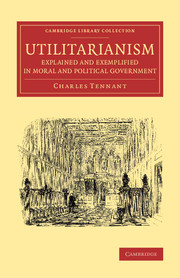
- Publisher:
- Cambridge University Press
- Online publication date:
- November 2014
- Print publication year:
- 2014
- First published in:
- 1864
- Online ISBN:
- 9781107286641

A founder in 1830 of the National Colonization Society, Charles Tennant (1796–1873) advocated government support for emigration to Britain's colonies as a means of alleviating poverty at home and boosting the workforce overseas. Briefly representing St Albans in Parliament, he later wrote treatises on contemporary political and financial questions, notably arguing for the abolition of income tax in The People's Blue Book (1857). Also published anonymously, the present work, which appeared in 1864, offers a critique of John Stuart Mill's Utilitarianism (1863). Tennant argues that happiness does not consist in utility, but rather in conformity to divine will as described by the Christian faith. Nevertheless, Tennant says, we ought to promote utility, as this is likely to be conducive to happiness. He then applies this view in detail to contemporary problems of government, domestic policy, taxation, colonies, dependencies, and foreign policy.
 Loading metrics...
Loading metrics...
* Views captured on Cambridge Core between #date#. This data will be updated every 24 hours.
Usage data cannot currently be displayed.